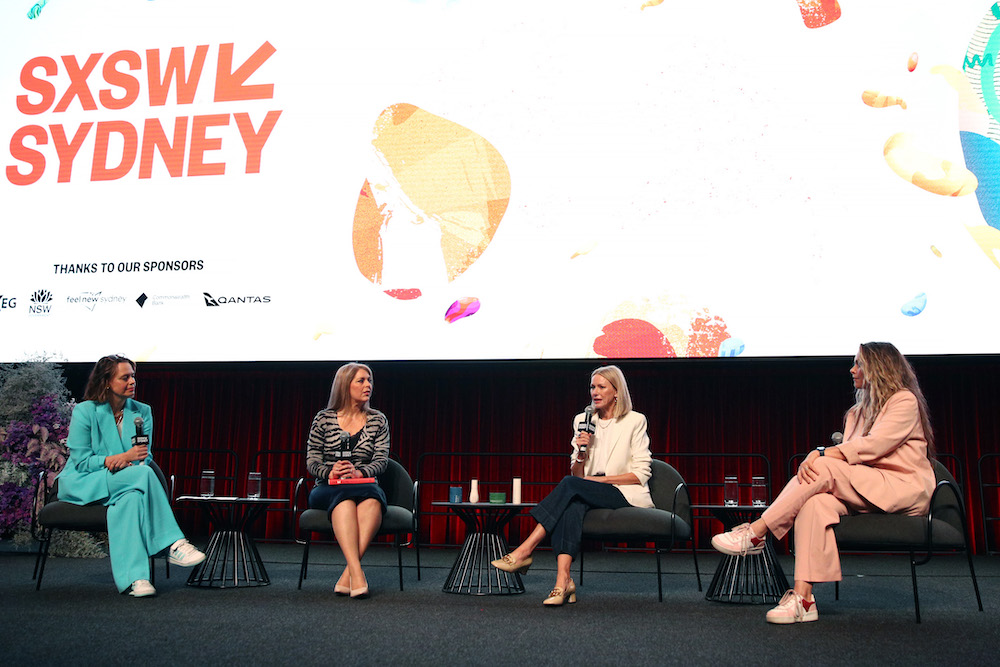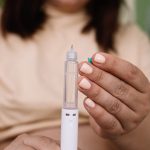Imagine being told that as a woman and once you reach a certain age, you’ll be “unf***able” and your career will take a hit.
That’s what happened to Naomi Watts, who once heard an agent use that term long ago.
“‘You better get going, you better put your pedal to the metal – work, work, work, because you’ve only got until you’re 40’,” she recalled the agent saying when sharing the bitter memory with a South by South West (SXSW) audience in Sydney this week.
“And I said, ‘What is that? Why?’ And he goes, ‘Because well, you know, you become unf***able and you can’t play a leading lady.”
On the panel joining the Hollywood star was Alison Brahe-Daddo, Dr Ginni Mansberg and moderator Mia Freedman, who affectionately referred to the quad as “The Beatles, but with hot flashes”.
The panel sat on the stage in the Great Hall at UTS, discussing the once-taboo topic that impacts roughly half the population: menopause.
The rollercoaster before menopause
Watts was just 36-years-old when she did some tests and found out she was close to menopause.
“I happen to go to my doctor and said, ‘Look, I’m not getting pregnant, can you explain why I’ve spent my whole life trying not to get pregnant and now suddenly, I want to get pregnant, and it’s not happening?’” she said.
“And so the doctor suggested that we take a blood panel, and the bloods suggested that I was close to menopause and so that’s where the panic came in.”
Mansberg explained that menopause is a single day – exactly 12 months from the first day of your last-ever period.
“Only you didn’t know what was your last period because, at that point, they’re all over the place. You didn’t know whether another one was coming in three months or six months or two weeks for all you know,” she said.
But in the lead-up to that day it’s a “rollercoaster” known technically as perimenopause, she said.
For Brahe-Daddo, she hadn’t even heard the word “perimenopause” until she had her first symptom around the age of 45.
“I thought menopause was just your period stopping. I honestly thought that’s all it was,” she said.
However, as the four women up on stage, and many more around the globe can attest, it is so much more than that. From hot flashes, insomnia, depression, anxiety to all the hormonal changes.
“The peak period of vulnerability in a woman’s life is actually around perimenopause and in the early postmenopausal years. It’s actually the peak time to suicide as well,” Mansberg said, adding that divorce and careers ending is also common.
Mia Freedman, Naomi Watts, Dr Ginni Mansberg and Alison Brahe-Daddo all shared their journey.
Menopause still stumps doctors
The best way forward with perimenopause and menopause is different for everyone.
However, one thing all should do, even beyond menopause, is advocate for yourself when speaking with a doctor.
Mansberg explained that hormone replacement therapy is nothing to be afraid of, despite outdated concerns it can cause breast cancer.
“The benefits of HRT … will outweigh the risks,” she said.
A study from the early 2000s which linked HRT to increased risk of breast cancer had damning effects, Mansberg added, with drug companies essentially halting their women’s health division.
Mansberg, a doctor, said she never got a single hour of training related to menopause when she was studying.
“And most doctors to this day know nothing about management of menopause,” she said, adding that she sees plenty of patients who have had their concerns dismissed by their GPs.
Watts implored people to advocate for themselves when seeking medical advice, which is something you should do whether it’s menopause-related or not.
“If your doctor is not going to give you or hear you in the right way, then you really should just change your doctor,” she advised.
The upside to menopause
Menopause gets a bad rep for good reason as it can be a difficult time in life to navigate. However, there is light at the end of the tunnel and for some it can be a transformative time.
For Brahe-Daddo, initially menopause was tough. Her body changed, she felt depressed as though she had disappointed those around her.
“I had to really sort of dig deep into myself in a way and go, ‘Well, who am I?’,” she said.
“And it [menopause] really made me look at myself as a woman and just go, ‘Okay, am I who I want to be?’ Really, it’s not about how I look, it’s got to be how I feel.”
Brahe-Daddo said she now puts herself first and has stopped people-pleasing.
Freedman noted that she, Brahe-Daddo and Mansberg were all married when it started for them, but Watts was in a new relationship with her now-husband.
Many marriages breakdown amid menopause, as do other relationships, but Watts stressed the importance of communication, not only for the sake of relationship, but to further the conversation.
“The more people understand that, the more we normalise and open this conversation up and just get used to it, the better,” Watts said.
Watts’ mother never told her that she too had gone through an early menopause.
She sat alongside Freedman, Brahe-Daddo and Mansberg hoping they would be the last generation that felt shame around something so common and so natural.
The post Naomi Watts speaks frankly about menopause, the last taboo appeared first on The New Daily.







